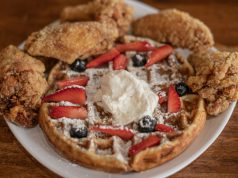By Glenn Ellis
Yes, it may be the most wonderful time of the year but the holiday season is also at the top of the list for health hazards, too. No wonder hospital admissions shoot up between December 19 and the New Year!
So, keep safe and follow a few tips for a happy, healthy Christmas and Holiday Season:
- Accidents at home
Holiday accidents range from cuts opening presents to people electrocuting themselves putting up lights and falls putting up decorations. Use round-tipped scissors rather than knives to open presents, assembling toys with proper tools, using a sturdy stepladder to put up decorations, keeping halls and stairs clear and moving decorations well away from toddlers who could cut themselves or choke on them.
- House fires
It just wouldn’t be the holidays without lights or festive candles; but both are fire hazards. Candles alone spark thousands of house fires each holiday season. Be careful not to overload sockets and never leave candles or cooking unattended. And don’t forget to test your smoke alarms. You’re at least four times more likely to die in a house fire if there’s no working smoke alarm.
- Full-blown flu virus
Besides ruining Christmas for anyone, flu can lead to life-threatening complications for people with underlying conditions. Anyone over 65 or with a chronic condition such as asthma, diabetes or heart disease should think about getting a flu shot. Although it takes 10 to 14 days for your immune system to respond fully to the flu shot, if you act quickly, you’ll still get a degree of protection by Christmas and by New Year, once the vaccine’s full effectiveness will have kicked in.
- Asthma attacks
Statistics show that someone will have an asthma attack every 10 seconds on Christmas Day and 200 of them will end up in the hospital. December is full of potential asthma triggers, including cold weather, stress, smoke from open fires and strong fragrances from perfume and scented candles. Even real Christmas trees are a danger as they can harbor mold spores that trigger reactions in some people.
You can reduce your risk by taking your preventer medicine as prescribed. Research suggests that, on average, half of people with asthma don’t do this.
- Running out of medications
It’s easy to overlook this in pre-Christmas panic but with many pharmacies shut over the holiday period, it could be a disaster. Check that your first-aid kit is stocked up and that any tablets or medicines are within their expiration date. If you take prescription medicine, make sure you have enough to last over the festive period.
- Dropping daily temperature
A fall in the average daily temperature of just a few degrees at any time of year is associated with 200 extra heart attacks over the following 28 days. When you become cold, your blood vessels constrict, forcing water to leave your circulation. As a result, your blood becomes thicker and more likely to clot, increasing your heart attack risk. People who suffer from lung diseases such as emphysema or chronic bronchitis, are also particularly sensitive to changes in the temperature. Try to keep the temperature throughout your home constant; especially if anyone elderly is staying with you or people with heart or lung disease. If this applies to you, wear layers so you can adjust your temperature.
- Food poisoning
Food poisoning risk rises over Christmas because people cook food that they don’t usually cook – and for larger numbers. Always put raw meat at the bottom of the fridge so the juices, which may contain food-poisoning bacteria, can’t drip down, contaminating cooked food. Don’t overfill your fridge and make sure leftovers have cooled before putting them back to avoid raising the temperature, which encourages bacteria.
Most importantly, wash your hands and dry them thoroughly before preparing any food and after handling raw meat. Also, make sure to throw away leftovers after two days unless they’ve been frozen.
8. Horrible hangovers
During the holidays, most of us like a few drinks – which can often mean a few too many. Avoid “topping” drinks off: you may lose count of how many you have had. Try to drink water in between, or alongside, alcoholic drinks and if you drink mixed drinks, dilute them with juice rather than fizzy drinks, which increase the rate at which alcohol is absorbed into your blood.
- Diabetes control
Over the Holidays, eating routines change, along with the type of food we eat, which can pose particular risks for people with diabetes. Keeping control of your diabetes during the festive period can be a struggle, so if you check your blood glucose at home, you may want to do it more often. One or two high blood glucose readings shouldn’t affect long-term diabetes control, but aim to avoid persistently high readings. Staying active will help you manage your blood glucose levels so take a walk after the meal with a family member or friend and catch up on old times.
Also, make sure you don’t go for too long without eating; don’t drink alcohol on an empty stomach; keep your medication with you; and making sure that people know what to do in an emergency.
To ensure you make it to January 1 unscathed, keep these tips in mind.
Remember, I’m not a doctor. I just sound like one.
Take good care of yourself and live the best life possible!
The information included in this column is for educational purposes only. It is not intended nor implied to be a substitute for professional medical advice. The reader should always consult his or her healthcare provider to determine the appropriateness of the information for their own situation or if they have any questions regarding a medical condition or treatment plan.
Glenn Ellis, is a Health Advocacy Communications Specialist. He is the author of Which Doctor?, and Information is the Best Medicine. For more good health information, visit: www.glennellis.com.



